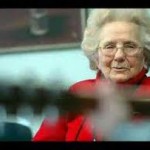Video: The Healing Power of Music Part 2
 By John Cane
By John Cane
Music therapy consists of an interpersonal process in which a trained music therapist uses music and all of its facets—physical, emotional, mental, social, aesthetic, and spiritual—to help clients to improve or maintain their health.
Music therapists primarily help clients improve their health across various domains by using music experiences: in communication, special needs, cognitive functioning, motor skills, emotional and affective development, behavior and social skills, listening in reminiscence/orientation work with the elderly, processing and relaxation work, and rhythmic entrainment for physical disabilities in stroke victims, and quality of life. Referrals to music therapy services may be made by other health care professionals such as physicians, psychologists, physical therapists, and occupational therapists. Clients can also choose to pursue music therapy services without a referral (i.e., self-referral).
Music therapists are found in nearly every area of the helping professions. Music therapy is also used in some medical hospitals, cancer centers, schools, alcohol and drug recovery programs, psychiatric hospitals, and correctional facilities.
This is Part 2 continued from last week’s ‘The Healing Power of Music’ series. In this video, you will see how music is used to help a child to communicate and gain a sense of self as she grows up. You will also see how music is used to help people with brain injuries and disorders; a way for them to exercise areas in the brain and to express emotions needed for a healthy life.
by: KVIE
ArticleCity.com Videos
http://www.articlecity.com/videos/health/The-Healing-Power-of-Music-Part-22-303548889.php
About the Author
John Cane is a motivational speaker and writer who develops and implements confidence and self-esteem workshops in North Carolina, South Carolina, and New York. With a background in Psychology, John has six certifications in Personal Growth and Development. His Journal Books, ‘Important Things I Remember from My Parents’ are used in schools and as an aid for adults in gaining strength in self identity in the United States and Europe.







